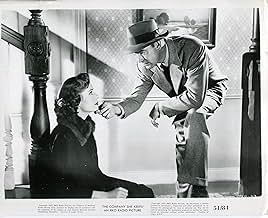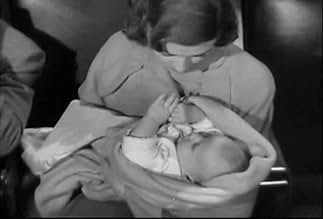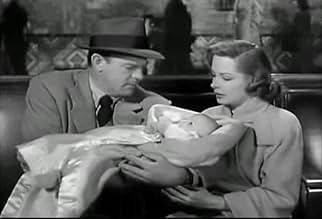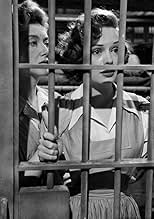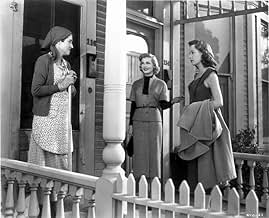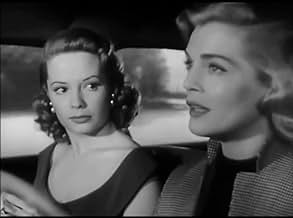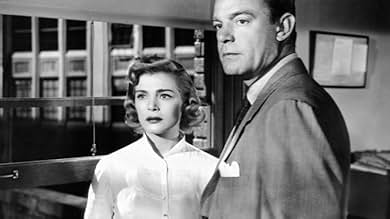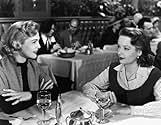CALIFICACIÓN DE IMDb
6.3/10
671
TU CALIFICACIÓN
Una ex convicta intenta reconstruir su vida después de ser liberada de la prisión.Una ex convicta intenta reconstruir su vida después de ser liberada de la prisión.Una ex convicta intenta reconstruir su vida después de ser liberada de la prisión.
- Dirección
- Guionista
- Elenco
Eric Alden
- Sergeant of Detectives
- (sin créditos)
Parley Baer
- Steve
- (sin créditos)
Larry Barton
- Store Detective
- (sin créditos)
June Benbow
- Myrtle
- (sin créditos)
Lela Bliss
- Window Shopper
- (sin créditos)
Gail Bonney
- Nurse
- (sin créditos)
- Dirección
- Guionista
- Todo el elenco y el equipo
- Producción, taquilla y más en IMDbPro
Opiniones destacadas
Parole officer (Scott) and parolee Diane (Greer) compete for the same man (O'Keefe), creating conflict on several levels. At best, the movie's about the difficulties of being on parole.
Oddball little programmer. Scott gets top billing, but as others point out, it's Greer who gets the screen time. And far from her usual slinky seductive role, she's not only de-glamorized, but also suitably dour-faced (just count her smiles; I stopped after one). All in all, it's a rather grim screenplay, drably photographed, and I can't believe the studio expected the final product to make money.
Despite the romantic triangle that strains believability, there are several striking scenes. Catch the iconic 40's diner where Diane gets her bottom-of-the-barrel meals. The sweat and steam just about drip off the wall. And that police line-up-- a graphic cross-section of the city's tough cookies, down-and-out'ers, and hopelessly pathetic (& one of the few barfing scenes from that era)-- are all herded along by a bullying cop (Freed). It's one of the more unvarnished glimpses of urban flotsam and jetsam from the period. Then there's the crowded jail cell where the camera abandons Diane (& us) to a nightmare of entrapment. It's an unnerving moment, very well done.
I would've liked the movie better had they made the triangle more credible, plus Scott's sacrificial character seems too good to be true. I expect the latter was RKO's effort at compensating for the harshness of the parole system as portrayed. Likely too, prestige producer John Houseman had something to do with the social realism phase, including the poignant overcoat episode. Anyway, reviewer bmacy's remarks on the influence of the previous year's Caged (1950) are on target. And, had this film carried through more with its realistic dimension, it might not be as obscure as it is.
Oddball little programmer. Scott gets top billing, but as others point out, it's Greer who gets the screen time. And far from her usual slinky seductive role, she's not only de-glamorized, but also suitably dour-faced (just count her smiles; I stopped after one). All in all, it's a rather grim screenplay, drably photographed, and I can't believe the studio expected the final product to make money.
Despite the romantic triangle that strains believability, there are several striking scenes. Catch the iconic 40's diner where Diane gets her bottom-of-the-barrel meals. The sweat and steam just about drip off the wall. And that police line-up-- a graphic cross-section of the city's tough cookies, down-and-out'ers, and hopelessly pathetic (& one of the few barfing scenes from that era)-- are all herded along by a bullying cop (Freed). It's one of the more unvarnished glimpses of urban flotsam and jetsam from the period. Then there's the crowded jail cell where the camera abandons Diane (& us) to a nightmare of entrapment. It's an unnerving moment, very well done.
I would've liked the movie better had they made the triangle more credible, plus Scott's sacrificial character seems too good to be true. I expect the latter was RKO's effort at compensating for the harshness of the parole system as portrayed. Likely too, prestige producer John Houseman had something to do with the social realism phase, including the poignant overcoat episode. Anyway, reviewer bmacy's remarks on the influence of the previous year's Caged (1950) are on target. And, had this film carried through more with its realistic dimension, it might not be as obscure as it is.
Jane Greer and Lizabeth Scott star in 1951's "The Company She Keeps," directed by John Cromwell and also starring Dennis O'Keefe. O'Keefe is columnist Larry Collins involved with parole officer Joan Wilburn (Scott), who has Diane Stuart (Greer) as a client. Stuart makes a play for Collins and gets him. The two fall in love, and Joan finds out about it, making her position rather difficult.
This isn't a big movie and provides a different sort of role for Scott. Here she's a good girl with shorter hair, and she almost reminds one of June Allyson. She's quite beautiful and does a good job, though I prefer her as a '40s bad girl. O'Keefe is a serviceable leading man.
The film belongs to the fabulous Greer. In the beginning, at her parole hearing, she's shy, soft and sweet. Once she's out - whoa! The angry, bitter tough gal comes through, only showing her vulnerable side once she falls for Larry.
Worth seeing for Greer.
This isn't a big movie and provides a different sort of role for Scott. Here she's a good girl with shorter hair, and she almost reminds one of June Allyson. She's quite beautiful and does a good job, though I prefer her as a '40s bad girl. O'Keefe is a serviceable leading man.
The film belongs to the fabulous Greer. In the beginning, at her parole hearing, she's shy, soft and sweet. Once she's out - whoa! The angry, bitter tough gal comes through, only showing her vulnerable side once she falls for Larry.
Worth seeing for Greer.
When diane (jane freer) is released from prison, she has a hard time adjusting; her parole officer joan (lizabeth scott) does her best to help diane ease back into society, and a new job. And somehow goes on a date with her parole officer's boyfriend. But that huge chip on her shoulder keeps giving her away. She snaps at everyone, and blames others for her own insecurity. She's so determined to hide her parolee status that it ends up working against her. When joan's boyfriend falls for diane, it all hits the fan. How will diane, joan and larry deal with all this? Complicated. It all kind of plods along. It's all pretty unlikely, as these things go. Directed by john cromwell, who was caught up in the HUAC shenanigans in the 1940s, 1950s, rightly or wrongly. He made this film and "the racket" before he was suspended. He also specialized in fun adventures in exotic, far-away lands, which were usually the back lot. Story by ketti frings. Watchable, but not very exciting.
This film does not fall short by any means. The Company She Keeps is a story of a young woman's plight named Diane Stuart (played by Jane Greer) that lands her behind bars on more than one occasion and when the opportunity for parole arises she has developed such a defeatist attitude that she feels she is fighting everyone in the (in)justice system. If Diane did not have bad luck she would have no luck at all. Once out of prison she visits with her parole officer Joan Willburn (played by Lizabeth Scott) and by accident or intention Diane finds the man of her dreams a newspaper columnist named Larry Collins (played by Dennis O'Keefe).
The three main characters in this film, Diane Stuart (ex-con), Joan Wilburn (parole officer), and Larry Collins (newspaper columnist) form the love triangle that has deception written all over this screen play. Lies, lies, lies, or is it just that each person is reluctant to hurt the others feelings?
As the film progresses we the audience realize that even female paroled prisoners are still considered ex-cons and their life is subjected to hell, especially in the year 1951 which is when this film was released. Truth be told, the rights and freedoms of ex- cons has not progressed much over the past 70 odd years.
Inevitably Diane finds herself in a police line-up once again for nothing at all and she realizes her life is crap and any chance of true love, life and freedom was nothing more than a pipe dream.
I won't spoil the film for anyone, but I will say that the director John Cromwell provided the audience with a surprise ending that should make most of his audience leaving the movie theater with a lot to talk about. The performances of Lizabeth Scott, Jane Greer, and Dennis O'Keefe were top notch. After close to 70 years since the films release I felt the film still contains a lot of human interest as it relates to crime and punishment.
I give the film 4**** of 5*****.
The three main characters in this film, Diane Stuart (ex-con), Joan Wilburn (parole officer), and Larry Collins (newspaper columnist) form the love triangle that has deception written all over this screen play. Lies, lies, lies, or is it just that each person is reluctant to hurt the others feelings?
As the film progresses we the audience realize that even female paroled prisoners are still considered ex-cons and their life is subjected to hell, especially in the year 1951 which is when this film was released. Truth be told, the rights and freedoms of ex- cons has not progressed much over the past 70 odd years.
Inevitably Diane finds herself in a police line-up once again for nothing at all and she realizes her life is crap and any chance of true love, life and freedom was nothing more than a pipe dream.
I won't spoil the film for anyone, but I will say that the director John Cromwell provided the audience with a surprise ending that should make most of his audience leaving the movie theater with a lot to talk about. The performances of Lizabeth Scott, Jane Greer, and Dennis O'Keefe were top notch. After close to 70 years since the films release I felt the film still contains a lot of human interest as it relates to crime and punishment.
I give the film 4**** of 5*****.
The film begins with the parole board meeting at a woman's prison. They are discussing Diane Stuart's case. She's granted parole and moves to Los Angeles. Once there, she's met by her new parole officer, Joan Wilburn (Lizbeth Scott). The p.o. is VERY positive and friendly--unrealistically so, actually. She seems more like a cheerleader than an officer of the court. All this occurs while Diane acts as if she'd rather be anywhere than with Joan. Pleasant, she is not.
While Diane does okay on parole, she is a conniver. When she sees Joan with her boyfriend, Larry (Dennis O'Keefe), she decides to get him for herself and slowly he falls for her. However, unexpectedly, she falls for him as well. Here is where is gets more ridiculous--Joan isn't thrilled by all this but is super-supportive and pushes to get the pair permission to marry. As for Diane, she's broken-hearted and expects the worst. What's next?
When the film began, I loved Greer's character. She was wonderfully noir--with a bad attitude and a hard edge. But, when she suddenly actually fell for Larry AND her p.o. was so supportive, the film felt very sappy...and lame as well as VERY inconsistent. Up until then, I would have given this one an 8 or 9. How could they have screwed up so badly?!
While Diane does okay on parole, she is a conniver. When she sees Joan with her boyfriend, Larry (Dennis O'Keefe), she decides to get him for herself and slowly he falls for her. However, unexpectedly, she falls for him as well. Here is where is gets more ridiculous--Joan isn't thrilled by all this but is super-supportive and pushes to get the pair permission to marry. As for Diane, she's broken-hearted and expects the worst. What's next?
When the film began, I loved Greer's character. She was wonderfully noir--with a bad attitude and a hard edge. But, when she suddenly actually fell for Larry AND her p.o. was so supportive, the film felt very sappy...and lame as well as VERY inconsistent. Up until then, I would have given this one an 8 or 9. How could they have screwed up so badly?!
¿Sabías que…?
- TriviaAt one point, four month-old Jeff Bridges, playing the baby Jane Greer is holding in the train station, was supposed to cry. To get him to cry, Jeff's mother, Dorothy Dean Bridges, suggested they pinch him.
- ConexionesFeatured in 2019 Golden Globe Awards (2019)
Selecciones populares
Inicia sesión para calificar y agrega a la lista de videos para obtener recomendaciones personalizadas
- How long is The Company She Keeps?Con tecnología de Alexa
Detalles
- Fecha de lanzamiento
- País de origen
- Idioma
- También se conoce como
- The Company She Keeps
- Locaciones de filmación
- 114-116 North Hope Street, Los Ángeles, California, Estados Unidos(Diane Stuart's apartment building)
- Productora
- Ver más créditos de la compañía en IMDbPro
- Tiempo de ejecución1 hora 22 minutos
- Color
- Relación de aspecto
- 1.37 : 1
Contribuir a esta página
Sugiere una edición o agrega el contenido que falta

Principales brechas de datos
By what name was Dos mujeres (1951) officially released in Canada in English?
Responda
